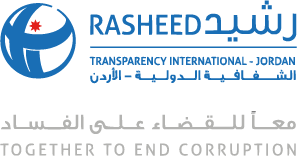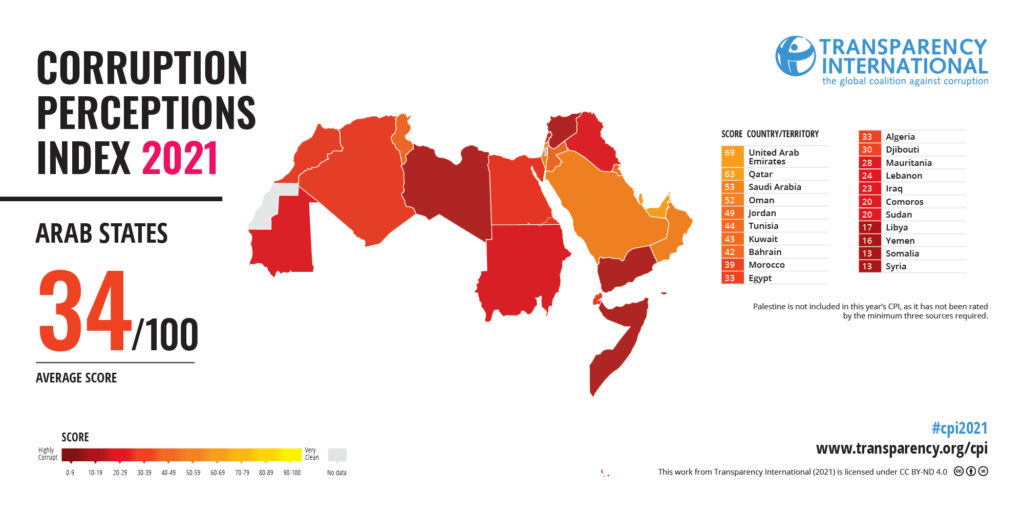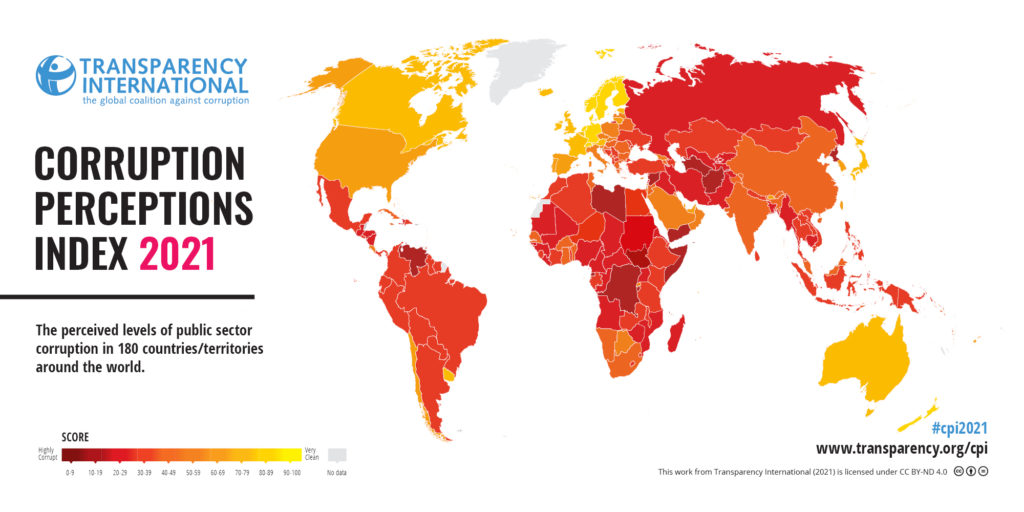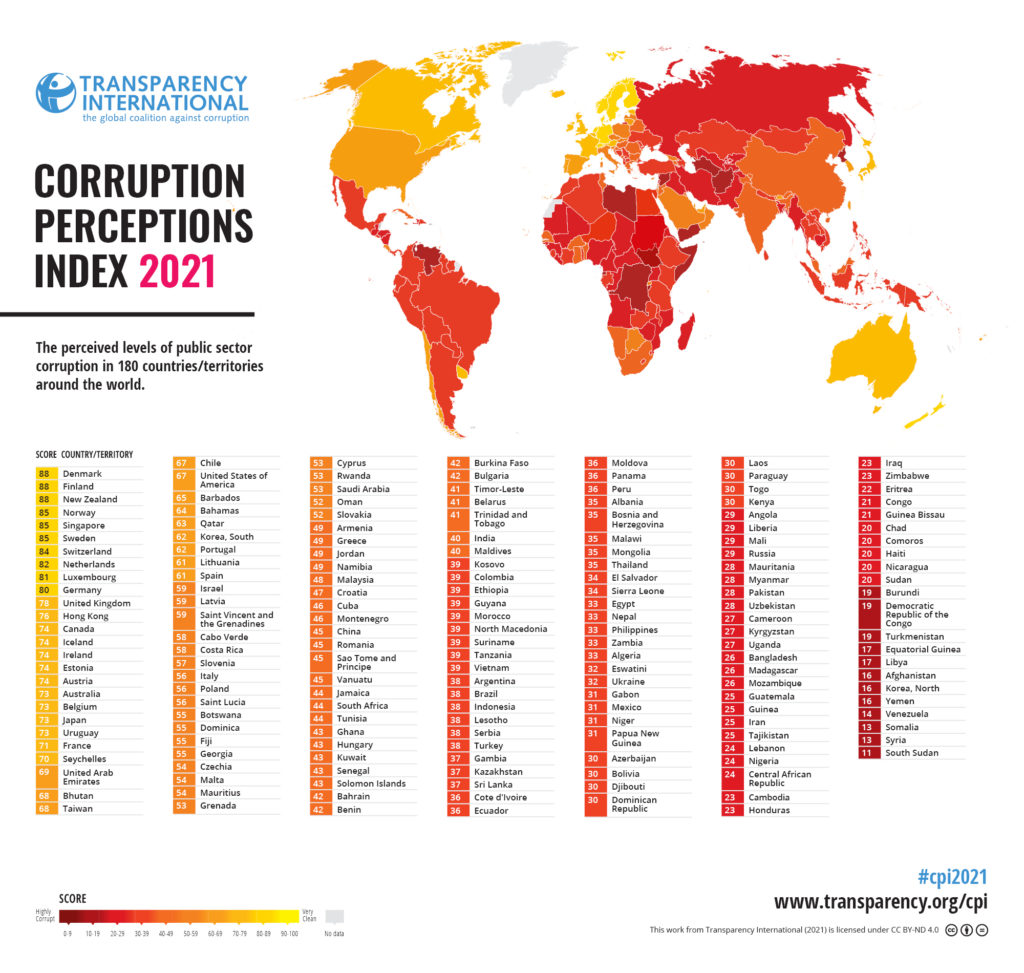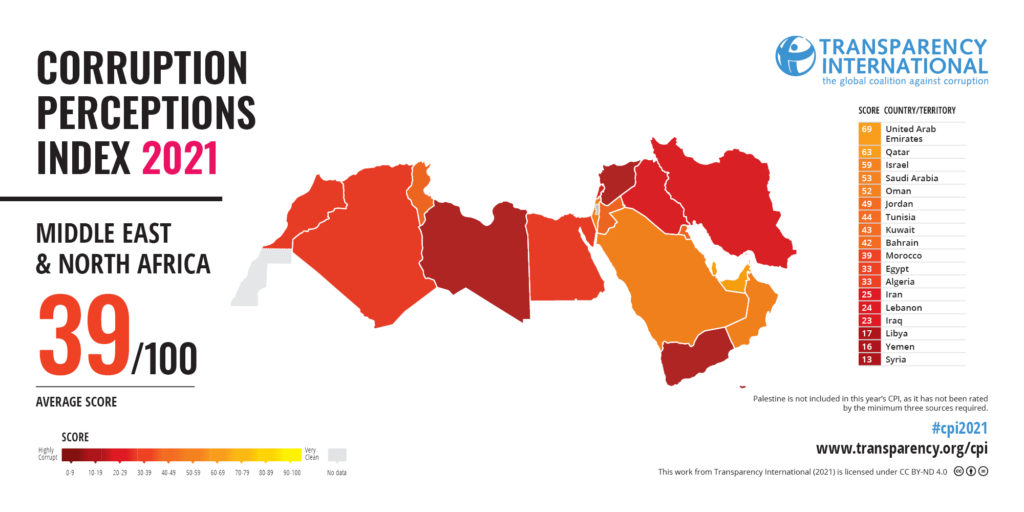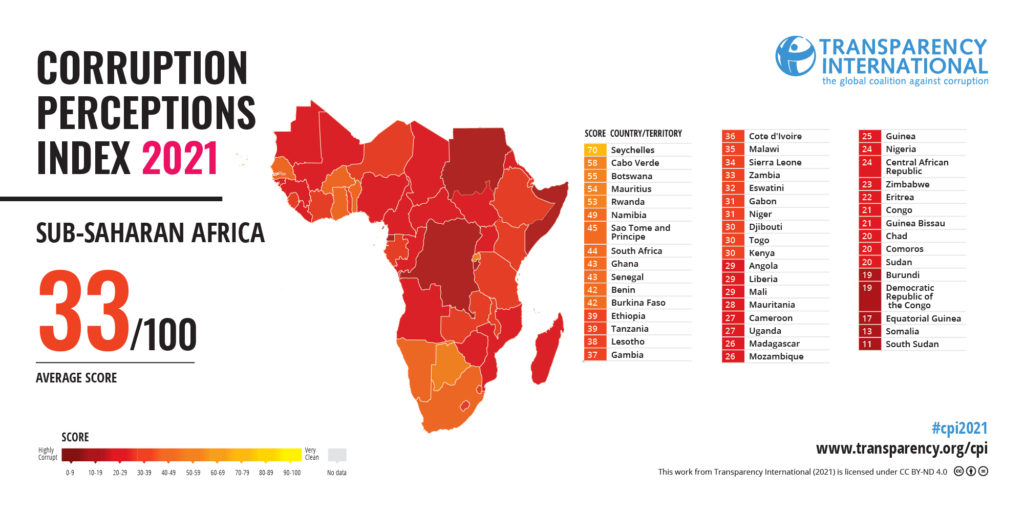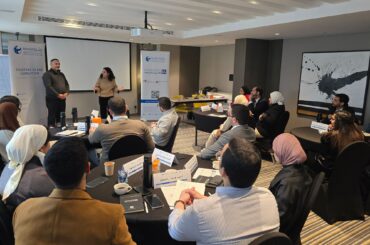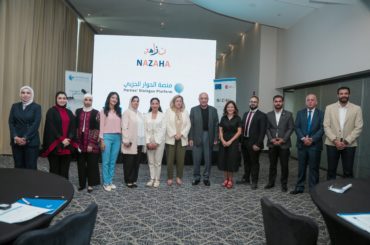- Jordan scored 49 out of 100, maintaining the same score of 2020
- Jordan’s improved its score on the source of World Competitiveness Yearbook issued by the Institute for Management Development by 9 points, and on the Executive Opinion Survey issued by the World Economic Forum by one point
- Jordan regressed on three resources this year, namely: The Bertelsmann FDN Transformation Index by (-4) degrees, The Political Risk Services International Country Risk Guide by (-4) degrees as well, and The World Justice Project Rule of Law Index by (-2) degrees
- In the Arab world, the United Arab Emirates scored 69 and Qatar 63, which is the highest score on the index compared to the rest of the Arab countries, while Yemen scored 16, and Syria and Somalia 13, which is the lowest score on the index.
- Data collection was completed in October 2021.
Rasheed (Transparency International-Jordan), the national chapter of Transparency International, released today the results of the 2021 Corruption Perceptions Index, which was prepared by Transparency International. The Corruption Perceptions Index ranks 180 countries and territories by their perceived levels of public sector corruption, according to experts and business sector.
The Corruption Perceptions Index is a composite index, a combination of different international surveys and assessments of corruption, collected by a variety of reputable institutions to determine the degree of corruption in the public sector in 180 countries, by assigning a score ranging from 0-100, where 0 is highly corrupt and 100 the highest integrity level.
The Corruption Perceptions Index covers a range of topics of concern to the public interest, such as bribery, accountability and monitoring of how public funds are used, embezzlement of public funds, officials’ misuse of their positions for personal gain, the government’s ability to reduce corruption, and routine and bureaucratic procedures that contribute to increasing the chances of corruption, nepotism and favoritism in public job appointments.
It also deals with the protection of whistleblowers, journalists and investigators in the event they report cases of corruption, the ability of civil society to access information of public interest and the space for accountability available to citizens, in addition to the ability to access justice and enforce the law.
These topics fall within eight sources used to calculate Jordan’s score for this year, which are:
- Bertelsmann FDN Transformation Index
- Economist Intelligence Unit Country Ratings
- Global Insight Country Risk Ratings
- The World Competitiveness Yearbook
- Political Risk Services International Country Risk
- Varieties of Democracy Project
- World Economic Forum EOS
- World Justice Project’s Rule of Law
According to the results of the index for the year 2021, Jordan scored 49 out of 100, maintaining the same score of 2020, noting that since 2017, Jordan’s score on the index ranged between 48 and 49. It is worth mentioning that Jordan’s score in 2015 was 53 out of 100.
In the Arab world, the United Arab Emirates scored 69 and Qatar 63, which is the highest score on the index compared to the rest of the Arab countries, while Yemen scored 16, and Syria and Somalia 13, which is the lowest score on the index. Perhaps the reason behind these low scores is the weak institutions, absence rule of law, the spread of impunity, the restriction and suppression of public freedoms, the weakening of civil society institutions and the absence of transparency in the preparation and disbursement of public finances.
Globally, Denmark, Finland and New Zealand scored the highest on the index with a score of 88, followed by Norway, Singapore and Sweden, each with a score of 85. Based on the analysis of Transparency International, it was found that these countries participated in the consolidation of human rights in terms of legislation and practices through gender equality and social justice and invested more than others in healthcare as they practiced democracy and the rule of law during the response to the COVID 19 pandemic by promoting freedom of opinion and expression and making information available to ensure the participation of male and female citizens in decision-making and to enhance the role of civil society organizations in services and oversight.
Jordan’s score improved on the source of the World Competitiveness Yearbook issued by the Institute for Management Development by 9 points, and on the Executive Opinion Survey issued by the World Economic Forum by one point, these two sources share the measurement of perceptions of bribery in the public sector. These two sources reflect the experience of businessmen with the public sector.
Jordan regressed on three indicators this year, namely: The Bertelsmann Transformation Index by (-4) degrees, and The Political Risk Services International Country Risk Guide by (-4) degrees as well. Both indices measure the extent to which perpetrators are held accountable and punished, and to what extent the government succeeds in reducing corruption in various state institutions, in addition to the extent of nepotism and favoritism, and the extent to which politics is linked to the business sector and its impact on the public sector.
Jordan also regressed on The World Justice Project Rule of Law Index by (-2) degrees, which focuses on the extent of the exercise of power by the government, the absence of corruption and the ability to establish security and safety, basic rights including health and others, ease of access and quality of service, and transparent government, law enforcement and the ability of individuals to access justice. This indicator reflects the views of male and female citizens and local legal experts.
As for the rest of the sources, Jordan maintained the previous scores.
Based on the results of the Corruption Perceptions Index, Rasheed recommends the following:
- Strengthening the role of supervisory bodies and institutions by allocating sufficient funds and resources to them and enhancing the administrative and financial independence necessary to perform their duties.
- Make the results of the follow-up committee on the recommendations of the annual report of the Audit Bureau publicly available.
- Inclusion of special funds and donations (Local and international) allocated to combat the Corona pandemic under the supervision of the Audit Bureau and the regulatory authorities.
- Completing the harmonization of all legislations to comply with the United Nations Convention against Corruption and bilateral agreements, in addition to updating and improving the current legal texts according to the Jordanian experience.
- Ensuring disclosure of actual beneficial ownership and transparent contracting to combat abuse and conflict of interest.
- Establish transparent central records for foreign companies that bid on public contracts and purchase real estate.
- Ensure the right of access to information and proactive disclosure of information to the public in a clear and accessible manner, and ability for electronic periodic analysis. Publishing data on public spending and the distribution of resources in general, and in cases of emergencies and crises in particular, in order to enhance trust between the citizen and the state.
- Publishing the information contained in the financial disclosure declarations of candidates for elections, public officials, leaders of the government apparatus, and those in charge of managing the pandemic funds electronically, updating it annually, and opening channels of effective communication with citizens.
- Enhancing human rights, including civil space, by providing a clear legislative system that regulates the work and independence of civil society organizations on the one hand, and ensures subsequent oversight and governance of the public sector institutions related to their work, and lifting arbitrary restrictions and practices on civil society organizations.
- Not to overstep legal texts, considering human rights when applying laws, avoid harm by law enforcement personnel affiliated with various institutions, and take legal action against transgressors.
- Lifting restrictions on freedom of opinion and expression to enable accountability based on actual and not fictitious information, in order to restore trust between the citizen and the state.
- Ensure the protection of whistleblowers, encourage reporting and support those who have suffered from corruption.
- Prosecuting all corrupt, without exception, and ensuring that they receive fair trials.
Transparency International Chair Delia Ferreira stated, “Human rights are not simply a nice-to-have in the fight against corruption. Authoritarianism makes anti-corruption efforts dependent on the whims of an elite. Ensuring that civil society and the media can speak freely and hold power to account is the only sustainable route to a corruption-free society.”
Rasheed for Integrity and Transparency (Transparency International – Jordan) is a non-profit civil society organization, established end of 2013, is the only national branch of Transparency International in Jordan. It aims to strengthen the pillars of good governance based on transparency, integrity, accountability and the rule of law, raise the level of integrity and combat corruption in the public and private sector, and enhance the awareness of individuals from various sectors of the importance of transparency, accountability and reporting on corruption, in addition to strengthening the legal and executive frameworks of the national integrity system, through communication cooperating and exchanging experiences with international, regional and national organizations and working to expand the circle of data and information available to citizens.

